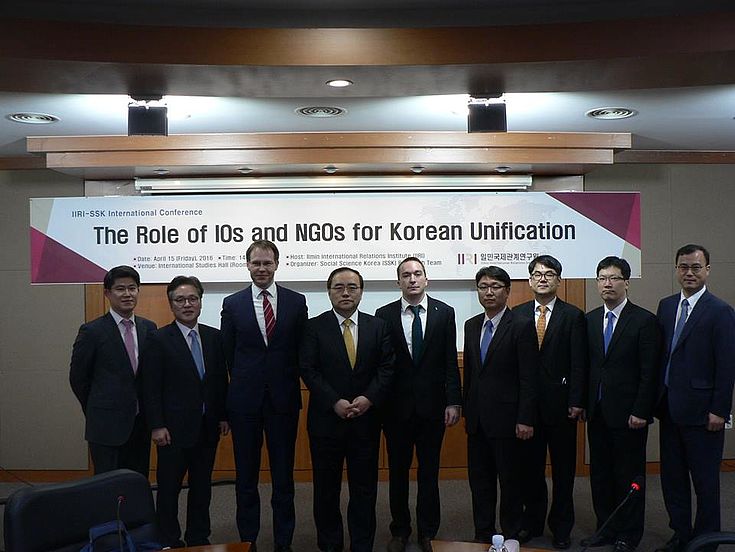The role of IOs and NGOs towards Korean Unification – Conference at the Ilmin Institute of Korea University
The conference on "The Role of IOs and NGOs for Korean Unification" was hosted by Ilmin International Relations Institute of Korea University
The conference was opened by welcoming remarks of Prof. Kim Sung-han, former Vice Minister of Foreign Affairs and Trade and Director of IIRI of Korea University. He emphasized the importance of the involvement of the South Korean civil society when dealing with unification issues on the Korean Peninsula.
The first session focused on the question about what IOs and NGOs learned from their involvement with North Korea. Prof. Moon Kyung Yun of Chonbuk National University pointed out that a dilemma between engagement and containment exists, especially considering the revolving political tensions such as after the nuclear test by North Korea on January 6th 2016. NGOs, however, are “acting at the front line” and serve as a tool for information exchange regardless of political tensions. He also noted that North Korea is not the “Hermit Kingdom” anymore that it once used to be, but that there is a continuing exchange between North Korea and the outside world; mainly through IOs and NGOs.
After the presentation by Prof. Moon, Felix Glenk, Project Manager for DPR Korea of Hanns Seidel Foundation, continued speaking about “Capacity Building in a challenging environment – a key aspect for reintegration of North Korea into international regimes”. He pointed out that North Korea once was a well-connected socialist state and that the “Great Disintegration” only followed after the dissolution of the Soviet Union and the Eastern Bloc. Today this disintegration is a major problem for the international community as there is an interest in North Korea as a reliable and responsible actor which complies with international standards and rules. Therefore the Hanns Seidel Foundation is trying to use the instrument of capacity-building to reinforce exchange and cooperation with North Korea while regarding the approach of “critical engagement” as an important tool to deal with the country.
The presentation was followed by statements of Stefan Samse, Resident Representative of Konrad Adenauer Foundation and Han Dong-ho, Director of the Center for North Korean Human Rights Studies of the Korea Institute for National Unification (KINU).
The second session of the conference with the topic “Preparation for Korean Unification” started with a presentation by Professor Hwang Jihwan of the University of Seoul. He put emphasis on the importance and difference between South Korean and international NGOs. Furthermore he explained how South Korean unification policies have varied in the past. Depending on which kind of ideological group leads the government, conservative or progressive forces, it can either have a positive impact on South Korean NGOs or limit their work. Another important aspect of his presentation was the state-centered unification approach in Sotuh Korea that focuses on the role of the four major powers in the region – China, the US, Japan and Russia. This approach also had a strong impact on the work of international IOs and NGOs.
A further presentation was held by Prof. Sohn Hyuk-Sang, Director of the Center for International Development Cooperation, who talked about government-NGO partnerships for international development cooperation. He concluded his speech by giving an impression on policy implications for development assistance to North Korea through NGOs. The conference was concluded by a discussion between Dr. Nam Sangmin, Deputy Head of UNESCAP Subregional Office for East and North-East Asia and Prof. Cho Han Seung of Dankook University.

